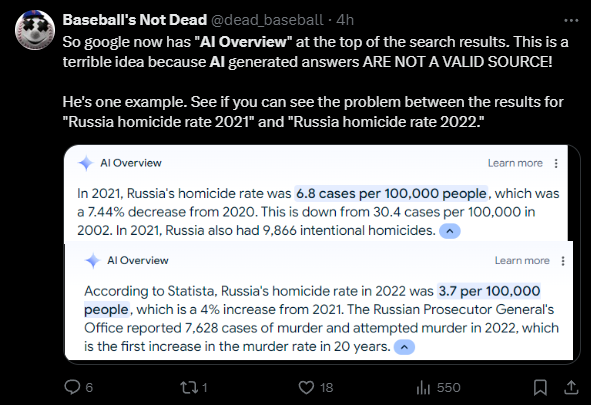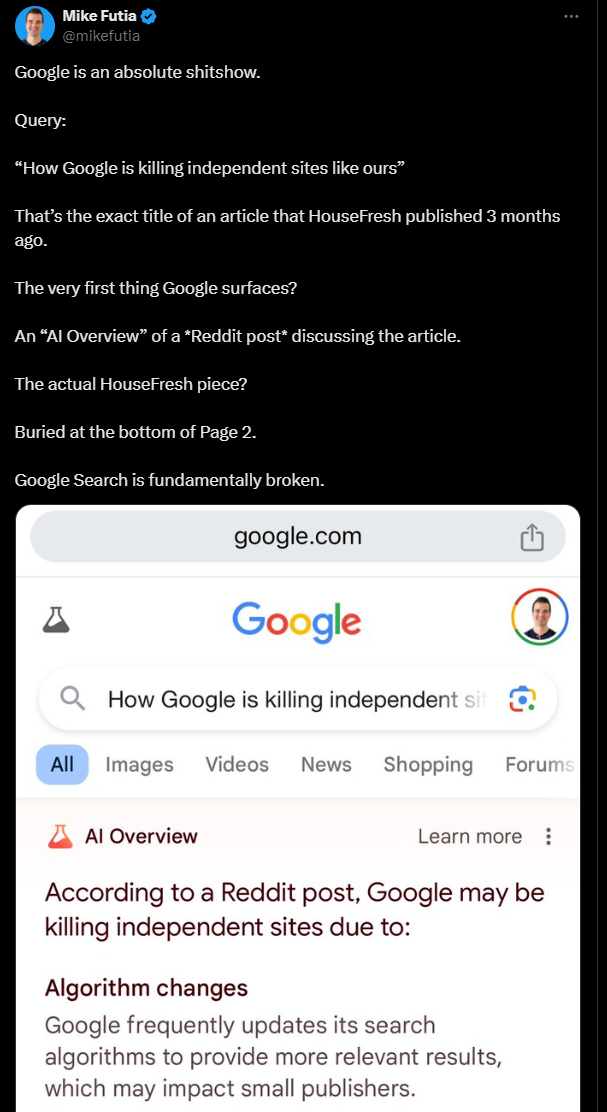“AI Overviews” are a prime example of Google’s double standards

Google is currently rolling out its AI-generated summaries in search across the US. Unless the company can prove the added value of its “AI summaries,” it’s violating its own spam policy.
To combat generative AI spam, Google recently introduced the “Scaled Content” policy, which threatens websites with sanctions for “creating large amounts of unoriginal content,” including through the use of generative AI tools, “without adding value for users.”
Ironically, Google’s policy describes the very spam techniques it employs for its own generative AI search as potential violations.
These include “scraping feeds, search results, or other content to generate many pages (including through automated transformations like synonymizing, translating, or other obfuscation techniques)” and “stitching or combining content from different web pages without adding value.”
Ad
Ad
Of course, Google has built a loophole into the policy. The critical question, which cannot be answered objectively, is whether Google’s AI search adds value for users.
Reactions to “AI overviews” in social and editorial media suggest that the answer is currently “no,” with publishers complaining about the alleged theft of their content and users reporting absurd or, more dangerously, tiny, almost hidden errors in AI results that many may not even notice.

Google’s list of misconduct also includes: using unlicensed material to train AI, AI-assisted rewriting of third-party content for its own profit, wrong answers even in a medical context where it is not clear who is responsible, and massive disruption to the Internet content ecosystem and the business models of hundreds of thousands of companies.

These serious flaws raise the question of why such a product can be rolled out to millions of people in its current state, especially since they have been evident since its first rollout in May 2023.
The EU is already closely monitoring Microsoft due to misinformation generated by its Bing chatbot, which pales in comparison to Google’s market power. This may explain why Google is testing its AI search results worldwide, but not in the EU.
Recommendation
Google CEO Sundar Pichai is dishonest
Meanwhile, Google CEO Sundar Pichai is using the same delaying tactics as a year ago, claiming that overall search usage is increasing, and that Google will prioritize approaches that drive traffic to websites. Empty words, as Pichai offers neither numbers nor concrete measures.
The real contradiction to Pichai’s statement lies in the product itself: With AI search, Google provides users with comprehensive information directly in the results, making it unnecessary to visit the actual websites. The company then claims to be seeking ways to drive more traffic to these sites, even though the original search was the best way to generate this traffic.
Google is destroying what made the company great: the diversity of the human-made World Wide Web. This madness is driven by the relatively small traffic successes of OpenAI’s ChatGPT and the immense hype surrounding generative AI.
It is up to users to decide if they want an open Web of content by people, for people. If they do, Google is now giving them the best reason to change their search engine for good.











